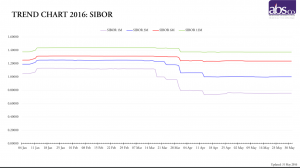
Negative Interest Rates and How It Can Affect You
Negative interest rates have come into the spotlight recently as the Bank of Japan rattled global markets by adopting negative rates in early 2016, more than 18 months after the European Central Bank became the first major financial institution to venture into sub-zero territory.
Beyond all that financial jargon, how does negative interest rates really affect us here in Singapore?
Defining Negative Rates
One of the incentives for lay persons like us, is to keep our money in the bank instead of under our pillow to earn interest (even if it’s minimal). This situation, where the bank pays out interest, is the norm for many of us, as we all know that the bank will be able to utilise the funds saved in the bank for other purposes and to get a higher yield out of it.
Imagine the scenario where you save your money in the bank and you need to pay $1 per month to the bank. It’s not much, but may send you wondering, can I perhaps put my money somewhere else?
The rationale for central banks to set negative interest rates is to encourage banks to lend and businesses/individuals to borrow. Since keeping money with the central bank is penalising (they need to pay interest), it is hoped that this will incentivise banks to lend out the money to earn an interest instead. With lower loan rates, consumers like us will be more willing to borrow the money for whatever reasons – start a business, buy a car or take up a renovation loan. This, in turn, will stimulate consumption and boost the economy.
From another perspective, it is also forcing ordinary folks to make better use of their money instead of putting it in a deposit account.
Implications
One of the most immediate impact for the man-on-the-street is that we may be less willing to save our money in the bank. This may not seem much of an impact on us, but it can deliver a huge blow to the banking system. The banking system works on the premise of customers saving money with the bank and them providing loans to borrowers. With a sudden dip in liquidity and funds, it could be a big blow to their business.
Another possible implication is that if more and more central banks around the world implement negative rates, this could work to keep overall interest rates low, and making it cheap to get a loan. Considering that we need to borrow money for various purposes throughout our lives – car loans, study loans, personal loans and home loans, wouldn’t it make interest payments so much cheaper? In fact, a couple in Denmark is getting paid interest on their mortgage!
Denmark had already started on its negative interest rates policy four years ago, and the European Central Bank and Bank of Japan are implementing negative interest rates as well. Central banks all over the world are warming to the idea in a desperate bid to boost economic growth.
Possible Effects On Singapore
As negative rates are quite a recent phenomenon and it’s unlikely to reach our shores yet, it’s hard to gauge its real impact but we can foresee some likely trends to follow:
- Low interest rates for longer
While the U.S Federal Reserve had stated that they will likely stay away from negative interest rates, it is hard to imagine that they will raise rates anytime soon when their European counterpart is lowering rates. Especially now that “Brexit” is underway, we can foresee interest rates in Singapore to stay low for a longer period.
Looking at the current SIBOR chart, you’d see that our anxieties over rising rates has been unfounded. In fact, the 3M SIBOR, which is often used as a benchmark rate for home loans, has been on a sharp decline since March this year.

Source: ABS
The immediate impact of this is that home-owners can rest assured that their mortgage loans will likely not increase in spurts, as what some mortgage brokers had thought earlier this year.
Those who are looking to buy a home may be in for a good surprise as the declining property market means lower home prices, coupled with low interest rates, making now a good time to look into property investment.
- Shift in Investment patterns – looking for higher yields
For those who were hoping that the Federal Reserve’s last rate hike will impact Singapore’s interest rates, you might be in for a disappointment. Thus, you might want to stop dreaming about higher interest paying deposit accounts or government bonds.
Instead, savvy investors would probably do good to look for higher yielding assets, looking at dividend stocks, investing in REITS or even gold.





